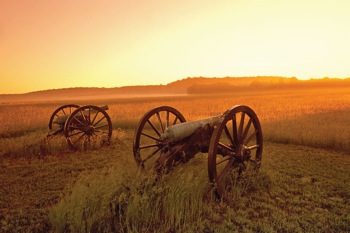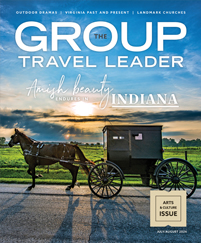 Courtesy Arkansas Department of Parks and Tourism
Courtesy Arkansas Department of Parks and Tourism
At 4 a.m., April 12, a brass band will begin playing Civil War period music at White Point Gardens on the Battery in Charleston, S.C. “The music will coincide with the anniversary of the first shot,” said Allison Lanford of the Fort Sumter-Fort Moultrie Historical Trust.
The music and accompanying mortar fire by the South Carolina National Guard are part of weeklong ceremonies and activities marking the 150th anniversary of the beginning of the Civil War when Confederate forces fired on Union-held Fort Sumter in Charleston Harbor.
Nearly half the states, including most of those in the South, where the majority of the fighting took place, have formed commissions or established initiatives to commemorate the Civil War sesquicentennial. The next five years will see a wide array of events and exhibits marking various anniversaries of the war.
The sesquicentennial provides incentives for groups to discover or rediscover Civil War sites in the South and to take part in interesting activities, but it is also a time for reflection. Many organizers and officials stress that the five-year period is a commemoration, not a celebration.
“We are not celebrating,” said Lanford. “It is a very solemn, somber event. We are very respectful of that period of time.”
Sharon Cavileer, communications consultant for the Prince William County/Manassas Convention and Visitors Bureau in Virginia, where the first major battle of the war occurred, said: “We are not glorifying war in the least bit. We are remembering a time in history that was painful, but Americans were forever changed.
“There has never been a better time to understand the value of the Union, our ability to compromise as Americans and our ability to peacefully resolve our differences. We paid a terrible price for doing it the other way.”
The American Bus Association has named the commemoration of the 150th anniversary of the First Battle of Manassas in July as the top domestic event for motorcoach groups this year.
“This is such an important time for Americans to remember this war,” said Cindy Dupree, director of communications for the Tennessee Department of Tourist Development. “This had the most impact of any event ever in the history of our country. To have the opportunity to promote these sites so people can come and experience is important as we go forward as a country so people don’t forget.”
Here’s a look at what a few Southern states are doing in conjunction with the Civil War sesquicentennial so that people do not forget.
South Carolina
“The National Park Service is looking at Fort Sumter as the premier event for the service for the year,” said Rick Hatcher, the historian at the national monument.
A series of events April 9-17 will feature re-enactors of Union and Confederate soldiers at Fort Sumter and nearby Fort Moultrie and civilian re-enactors at the Fort Sumter Visitor Education Center in Charleston.
“At the main tour boat facility in downtown, we are concentrating on civilian activities, from churches, music, children’s games and women’s activities during that time frame,” said Hatcher.
Lanford said that on the evening of April 11, a symphony orchestra and Civil War-era singers will perform at the Battery. “The fort will be lit up with lights around the perimeter to set the proper mood,” she said.
Hatcher said the fort is planning special programs through April 2015 in conjunction with the local community.
He said normal visits to the fort take about two hours; that includes an hourlong round-trip boat ride to the fort, which is on an island in the harbor.
“The fort is stabilized ruins,” he said. “When you come to the fort today, you will not see the fort you envision from engravings of the bombardment. But its significance is unchanged. It is where the war began.”
www.fortsumtertrust.org
www.sccivilwar.org
Virginia
Americans’ naive hopes that the war would be a short, glory-filled adventure were dashed in July1861 during bloody fighting around a small creek called Bull Run in Northern Virginia. Many people drove their horse-and-buggies from nearby Washington, D.C., to watch the battle and were caught up in the chaotic retreat of defeated Union soldiers.
A movie at the visitors center at Manassas National Battlefield Park appropriately sums up the action: “End of Innocence.”
This year’s 150th anniversary of the battle July 21-24 is the official kickoff of Virginia’s sesquicentennial commemoration. “It will be huge,” said Cavileer. “We are expecting as many as 12,000 re-enactors.”
The four-day event will feature concerts, speakers, living-history demonstrations, two Blue and Gray Balls, period music and special events at the 25 historic sites on the county’s Civil War Trail. The Ben Lomond House, a hospital for both sides where soldiers carved their names into the plaster walls, will be interpreted as a hospital during the sesquicentennial.
Old Town Manassas will hold a street festival and Sutler’s Row. “We will also focus on civilians, whose lives were incredibly disrupted,” said Cavileer.
The commemoration will culminate with re-enactments of the battle on Saturday and Sunday on a farm adjacent to the battlefield.
The event will also honor the 100th anniversary of the Peace Jubilee at Manassas when President William Howard Taft addressed a large gathering of Union and Confederate veterans and urged reconciliation.
“The survivors met on the battlefield and shook hands,” said Cavileer. “That is a little piece of history that has been forgotten. Nobody remembers those grassroots handshakes.”
www.visitpwc.com
www.virginiacivilwar.org
Tennessee
“I feel it is a wonderful, wonderful way to invite people to experience Tennessee in a way they might not have understood before,” said Susan Whittaker, commissioner of the Tennessee Department of Tourist Development. “It provides another opportunity to invite people to come in and experience history. We have got a lot of people paying attention to the Civil War.”
Whittaker, who is co-chair of the Tennessee Civil War Sesquicentennial Commission, said its goal is to tell the whole story of the war, especially stories involving women, African-Americans and civilians.
“The war was fought in our own front yards; it impacted every part of the state and every strata of society,” she said.
The entire state of Tennessee is a Civil War National Historic Area, the only state so designated by Congress.
To focus on its many Civil War sites, especially some of the lesser-known ones, the state expanded its participation in the Civil War Trails program with an aggressive program of placing historical markers at the sites and publishing a Civil War map.
“By spring, we will have 270 sites with markers in the ground,” said Whittaker. “Our criteria were you have to be able to get out of your vehicle comfortably and be able to read the marker and look up and see the very site being discussed.”
Whittaker said the initial printing of 500,000 maps in May was nearly exhausted by the end of the year, and a new, upgraded map has been printed.
Through 2015, the Tennessee commission will sponsor annual signature events focusing on different aspects of the war. The first one, last November in Nashville, focused on the coming of the war and featured speakers, living-history demonstrations and period music.
Arkansas
The first event to be commemorated in Arkansas fell between the first shots at Fort Sumter and the state’s secession from the Union on May 6.
“It’s a gray area,” said Jeremy Lynch, a national park ranger at the Fort Smith National Historic Site.
On April 23, the historic site will have a re-enactment of the day the fort fell under Arkansas state occupation.
“That is the exact day,” said Lynch, “when Arkansas state troops took the fort. Vignettes will portray the evacuation of the fort when it was basically surrendered by a doctor who had stayed behind to treat the sick. He was pardoned.”
Lynch said there would also be artillery and small-arms demonstrations and, it is hoped, an encampment.
Black Beaver, a Delaware Indian scout, led two companies of the Union’s First Cavalry to safety after they abandoned the fort. Officials hope that Kerry Holton, a direct descendent of Black Beaver and current president of the Delaware Nation, will take part in the re-enactment.
Lynch said temporary exhibits over the next five years at the site, which interprets several eras, will focus on the Civil War and the diversity of people involved.
The state’s official kickoff event will be April 30 at the Old State House Museum in Little Rock with a re-enactment of the secession convention and the airing of a public television documentary about Arkansas’ role in the Civil War.
The Old State House Museum will have a series of special sesquicentennial exhibits and programs over the next five years that include the conservation of two newly acquired Arkansas Confederate battle flags.
Amy Peck, public relations director for the museum, said new exhibits each year will focus on different themes. “The first year, which opens in late April, is ‘An Enduring Union,’ which will showcase some of the Civil War reunions that took place in Little Rock beginning in the early 20th century,” said Peck. “It will feature regalia and memorabilia.”
The second year will focus on battles that occurred in Arkansas, the third year will look at Union occupation, the fourth year will tell about the destruction that took place on the home front, and the final year will feature Reconstruction.
www.arkansascivilwar150.com
www.oldstatehouse.com
Georgia
The Georgia Department of Economic Development is using public-private partnerships to create ways to make it easier for groups and visitors to discover the state’s rich Civil War heritage.
In October, the department’s tourism division released the book “Crossroads of Conflict: A Guide for Touring Civil War Sites in Georgia.” The division partnered with the Georgia Civil War Commission, the Georgia Humanities Council and the UGA Press on the book, which features more than 350 Civil War historic sites.
The tourism division, in conjunction with the Georgia Historical Society, has produced “Georgia’s Map Guide to the Civil War,” which features 78 sites, with GPS coordinates, driving trails and a map.
“In addition to recognizing a period of great importance in our state, this five-year commemoration is also expected to generate a significant increase in heritage travelers to Georgia,” said Kevin Langston, deputy commissioner for tourism for the Georgia Department of Economic Development. “We want visitors and locals to experience the impact of the war on Georgia’s landscape, people and culture, not just what happened on the battlefields.”
This month (January), there was a re-enactment of the secession convention at the Old Capitol Museum in Milledgeville. Among the other 2011 events to be held in Georgia are the re-enactment of the Battle of Ressaca, May 21-22; the second annual Civil War Expo in Helen, June 18-19, with demonstrations and camps; the Battle of Tunnel Hill re-enactment, Sept. 10-11, which will include a walk through a 1,477-foot railroad tunnel built in 1850; and the 35th annual Andersonville Historic Fair, with mock Civil War battles, living-history programs, a parade, arts and crafts, and entertainment on two stages.
Mississippi
One of the most critical battlefields in Mississippi was on the water. The Mississippi River was vital for both sides, and several major battles were fought for its control.
Vicksburg was a key to controlling the river, and its surrender on July 4, 1863, after a 46-day siege was a major blow to the Confederacy.
“Vicksburg is the key,” said President Abraham Lincoln. “The war can never be brought to a close until the key is in our pocket.”
Over the next two and a half years, beginning with this spring’s annual historic home pilgrimage, Vicksburg will focus on civilian life during the Civil War.
“Homeowners will be in costume and represent the original owners of the homes,” said Bill Serrat, executive director of the Vicksburg Convention and Visitors Bureau and chairman of the state’s sesquicentennial commission. “Normally, it’s just a standard house tour. We are giving more information about what civilian life was like. It is all building up to July 4, 2013.”
Presentations at the houses will focus on making jewelry, Civil War surgical practices, the Vicksburg slave trade and making stained glass.
The 1,800-acre Vicksburg National Military Park has more than 1,300 monuments; the largest National Military Cemetery of Union dead, with 17,000 graves; reconstructed forts and trenches; authentic cannons; two antebellum houses; and the USS Cairo, a restored U.S. gunboat that was sunk during the siege and lifted from the bottom of the Yazoo River in 1964.
Mississippi State University worked with the sesquicentennial commission to develop a comprehensive website that was unveiled in early December.
“The Civil War sesquicentennial is a prime opportunity for promoting the myriad Civil War-related historical sites and cultural attractions around Mississippi,” said Mary Beth Wilkerson, director of tourism for the Mississippi Development Authority.










